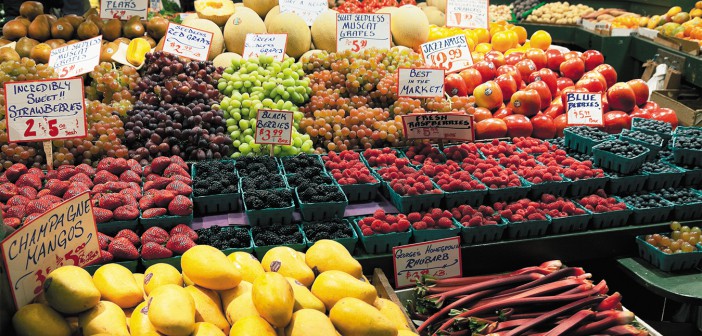How limited-service properties can effectively source, promote and embrace local foods and suppliers.
by LARRY MOGELONSKY, MBA, P.ENG.
Like many of you, I have fond childhood memories of idyllic trips to farm country where my family would stop at roadside stands during harvest time to buy some produce. Nowadays, I rekindle these summertime outings with frequent visits to urban farmers’ markets. What these experiences have in common is that they are both all about fresh fruits and vegetables with unrivaled flavor, seasonal variations and a far deeper trust as you exchange money directly with the farmer.
Now apply this sense of nostalgia to your hotel and you arrive at one of the fundamental rationales for the local food or locavore movement. Spend a few minutes with any chef and he or she will quickly tell you that the success of any dish is based upon the ingredients used. If fresher results in a better taste as well as better visual appeal and nutritional value, then locavore is the definitely way to go.
The past decade has seen local foods go from niche to mainstream and even to a guest expectation. Indeed, I’ve visited many restaurants where the menu proudly lists the names of the farms or producers whose ingredients were utilized, often accompanied by a map showing their respective locations in relation to the property. This identification process provides not only a badge of authenticity for the restaurant, but it boosts guest satisfaction and offers great social media fodder.
This is a trend that’s here to stay. But why does regionally sourced have to be limited to Michelin-starred restaurants and other haute cuisine establishments? While there is a greater expectation for local foods at fine dining eateries, nothing should prevent a limited-service or smaller independent property from jumping on this locavore bandwagon. And the sooner you do so, the sooner you will reap the rewards.
Assess your needs and start small
With few exceptions, North America has a bounty of outstanding farms producing just about everything that can be grown outside of an equatorial climate, often with many smaller operations located within easy reach of your property. Take a drive in pretty much any direction and you’re bound to find a few. Better yet, make it a company outing!
Rather than set out on a magical mystery tour in search of the perfect farm partner, start with an assessment of your F&B program and the logical integration of local product. If you operate a free-breakfast-only establishment, you’re somewhat restricted insofar as what you can introduce. For dedicated, rigidly structured restaurants like this, you have to test the waters. Consider an independent baker for your baked goods, introduce some craft jams or jellies or seasonally source fruit from a close-by orchard.
If you have a full-service restaurant, your opportunities for local input are endless. I recommend a strategic approach, though. Start with an examination of available suppliers. Don’t go ‘cold turkey’ with a goal of a 100-percent locally sourced menu overnight. Sourcing in this manner is not the same as calling a wholesaler. Some items might not be available in the quantities and timing you require. Still others may create a form of sticker shock given their higher prices, especially with regard to organic foods.
Strategic local sourcing means identification of suppliers, testing product quality, optimizing delivery performance and accepting a wider range of product variances. It also requires heightened communications between your chef and suppliers, both in terms of greater frequency with each individual supplier and a larger number of suppliers to deal with.
Again, start small. Think one or two local items such as fruit and vegetables, bread and pastries, or condiments and jams/jellies. Then after completing your initial strategic assessment, include chocolate and confectionaries, tea or coffee producers, spices and specialty items – packaged brands that guests can discuss onsite or bring home with them as part of a trinket souvenir.
At the entry level, with a few exceptions, shy away from meat, poultry and dairy products. There may also be some restrictions within your master franchise agreement that preclude you from considering these, not to mention agricultural inspection requirements as well as storage and handling. With anything consumed, product safety is paramount; any supplier that you feel does not deliver in this category is not partnership material.
Next, recognize that going local may lead to cost increases, largely due to the loss of economies of scale. It may seem odd, but a head of lettuce packed and air-freighted from South America is often cheaper than the same lettuce delivered from a farm 30 minutes away. Profitability is vital after all, but some lenience must be accommodated in lieu of the marketing and community-building benefits that local foods will accrue.
Wine and beer
Read any industry beverage magazine and you’ll quickly discover that ‘craft culture’ has widespread appeal. Not only do local wines and beers provide a sense of exclusivity to your venue, but chances are that you can build better margins in the process because customers are willing to pay a premium for the recognized quality and regional authenticity. Depending upon supplier relationships and what’s allowed by law, your menu program can be easily extended into promotional activities that might include winery or brewery tours as well as discount coupons and home-ship programs.
One lucrative strategy is to claim ‘only local products served’ status. While there are always some guests who are diehard Budweiser drinkers, this move is nevertheless exciting, provocative and bound to attract a good crowd. As a softer alternative, position yourself as a ‘local wine and craft beer headquarters.’ Either way, for maximum exposure, make sure to lead your beverage menu with these specialty items. And if you are a tad shaky in your knowledge of these products, I am confident you’ll find many volunteers ready to assist you in tasting your selections.
Communications is key to success
In any locally oriented program, the adage to remember is ‘to tell is to sell.’
Begin with your own team members. Familiarize them with your programs, recipes, products and overarching goals. Use maps to show them the actual location of each supplier. Then personalize the expression by, for example, exclaiming, “We get our apples from Joe Black’s orchard located in Beanstown, just 42 miles from here.”
Next, give your team the opportunity to taste everything so they can sell from experience. Have your chef explain the differences in how he or she prepares each dish. Have your bartender extol the virtues and unique taste sensations of the selected wines and beers. Create a small cheat sheet that gives line staff bullet points to jog their memory. Remember, your success will be based upon their ability to sell these products, and selling starts with telling the story.
With B2B communications as the foundation as awareness within the restaurant itself, consumers must also be made aware of your commitment in going local outside of this space. Depending upon your budget and marketing parameters, your approach should include guestroom sell sheets, tent cards, website displays and lobby posters. Local newspapers and community television networks are always interested in supporting programs of this nature. Lastly, social media is perfect for continual dissemination.
Hug a farmer
The farming, wine and brewing communities are small. Word will spread that you are local-friendly. You may soon discover that suppliers are approaching you! They may even have more than a few good suggestions to help you take full advantage of what’s around. In any case, your neighbors are to be cherished, and as a hotel you should strive to leverage your local sourcing endeavors to become a community leader.
It’s a mutually beneficial relationship – as your success increases due to your locavore embrace, so too does that of your suppliers. Even though local sourcing is not feasible in certain instances or as easy as calling a wholesaler to execute your entire shopping list, it nonetheless offers substantial rewards in the form of community pride and better product offerings overall. ■
Larry Mogelonsky ([email protected]) is the founder of LMA Communications Inc. (www.lma.ca), an award-winning, full-service communications agency focused on the hospitality industry (est. 1991). As a recognized expert in marketing services, his experience encompasses Four Seasons Hotels and Resorts and Preferred Hotels and Resorts, as well as numerous independent properties throughout North America, Europe and Asia.




